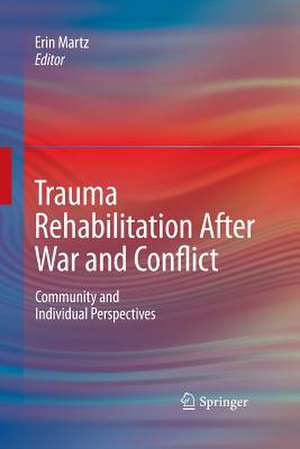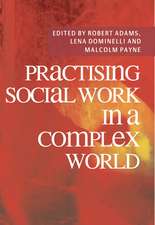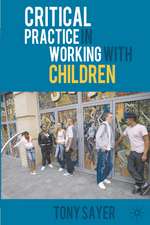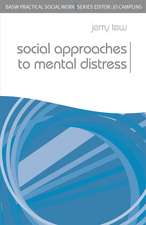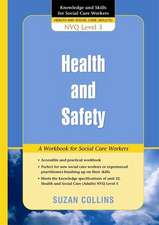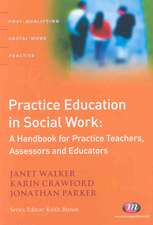Trauma Rehabilitation After War and Conflict: Community and Individual Perspectives
Editat de Erin Martzen Limba Engleză Paperback – 17 oct 2014
"This ground-breaking text provides the reader with an excellent and comprehensive overview of the existing field of trauma rehabilitation. It also masterfully navigates the intricate relationships among theory, research, and practice leaving the reader with immense appreciation for its subject matter." - Hanoch Livneh, Hanoch Livneh, Ph.D., LPC, CRC, Portland State University
Fear, terror, helplessness, rage: for soldier and civilian alike, the psychological costs of war are staggering. And for those traumatized by chronic armed conflict, healing, recovery, and closure can seem like impossible goals.
Demonstrating wide-ranging knowledge of the vulnerabilities and resilience of war survivors, the collaborators on Trauma Rehabilitation after War and Conflict analyze successful rehabilitative processes and intervention programs in conflict-affected areas of the world. Its dual focus on individual and community healing builds on the concept of the protective "trauma membrane," a component crucial to coping and healing, to humanitarian efforts (though one which is often passed over in favor of rebuilding infrastructure), and to promoting and sustaining peace. The book’s multiple perspectives—including public health, community-based systems, and trauma-focused approaches—reflect the complex psychological, social, and emotional stresses faced by survivors, to provide authoritative information on salient topics suchas:
- Psychological rehabilitation of U.S. veterans, non-Western ex-combatants, and civilians
- Forgiveness and social reconciliation after armed conflict
- Psychosocial adjustment in the post-war setting
- Helping individuals heal from war-related rape
- The psychological impact on prisoners of war
- Rehabilitating the child soldier
| Toate formatele și edițiile | Preț | Express |
|---|---|---|
| Paperback (1) | 1115.46 lei 6-8 săpt. | |
| Springer – 17 oct 2014 | 1115.46 lei 6-8 săpt. | |
| Hardback (1) | 1121.62 lei 6-8 săpt. | |
| Springer – 6 mai 2010 | 1121.62 lei 6-8 săpt. |
Preț: 1115.46 lei
Preț vechi: 1360.32 lei
-18% Nou
Puncte Express: 1673
Preț estimativ în valută:
213.45€ • 223.31$ • 177.31£
213.45€ • 223.31$ • 177.31£
Carte tipărită la comandă
Livrare economică 03-17 aprilie
Preluare comenzi: 021 569.72.76
Specificații
ISBN-13: 9781489983688
ISBN-10: 1489983686
Pagini: 456
Ilustrații: XVIII, 436 p.
Dimensiuni: 155 x 235 x 24 mm
Greutate: 0.64 kg
Ediția:2010
Editura: Springer
Colecția Springer
Locul publicării:New York, NY, United States
ISBN-10: 1489983686
Pagini: 456
Ilustrații: XVIII, 436 p.
Dimensiuni: 155 x 235 x 24 mm
Greutate: 0.64 kg
Ediția:2010
Editura: Springer
Colecția Springer
Locul publicării:New York, NY, United States
Public țintă
ResearchCuprins
to Trauma Rehabilitation After War and Conflict.- Exploring the Trauma Membrane Concept.- Forgiveness and Reconciliation in Social Reconstruction After Trauma.- A Public-Health View on the Prevention of War and Its Consequences.- Community-Based Rehabilitation in Post-conflict and Emergency Situations.- A Systems Approach to Post-conflict Rehabilitation.- Human Physical Rehabilitation.- Psychological Rehabilitation for US Veterans.- Psychological Rehabilitation of Ex-combatants in Non-Western, Post-conflict Settings.- Psychosocial Rehabilitation of Civilians in Conflict-Affected Settings.- Shame and Avoidance in Trauma.- Psychosocial Adjustment and Coping in the Post-conflict Setting.- Helping Individuals Heal from Rape Connected to Conflict and/or War.- The Psychological Impact of Child Soldiering.- The Toll of War Captivity: Vulnerability, Resilience, and Premature Aging.- Trauma-Focused Public Mental-Health Interventions: A Paradigm Shift in Humanitarian Assistance and Aid Work.
Recenzii
"This book has all the ingredients of a classic. Not only does it provide the reader with an excellent and comprehensive overview of the existing field of 'trauma rehabilitation,' it also masterfully navigates the intricate relationships among theory, research, and practice leaving the reader with immense appreciation for its subject matter. This ground-breaking volume should be a required text for all graduate students and practitioners who seek to acquire in-depth knowledge of the field of trauma rehabilitation on their journey to becoming skilled rehabilitation psychologists, counselors and social workers. I highly and unequivocally recommend this text to all of the above audiences."
-Hanoch Livneh, Ph.D., LPC, CRC, Portland State University
"In the devastating aftermath of war or other major conflict, development agencies tend to concentrate on the rebuilding of a country’s infrastructure, ensuring that basic human needs for food, shelter and water, and stable government are met. But too often the heaviest toll of conflict is the devastation of people’s minds and spirits; in the quest for ensuring material survival, it is this latter devastation that development organizations often overlook. The casualties of conflict are many - physical disabilities, mental illnesses, people torn from their social and familial support systems, each resulting in whole swaths of men and women left without any hope of earning their living. This book provides guidance to the development field on how to best heal the deep wounds suffered by a nation’s populace through the lens of post-conflict human rehabilitation. As foreign assistance flows into post-conflict regions with assistance designed to rebuild economies, roads, and schools - it is important that a segment of development professionals focus on the purely human element of rebuilding lives and societies. This book gives perspective on just how to begin that process so thatthe trauma people suffered is not passed on to future generations long after the violence has stopped."
-Amy T. Wilson, Ph.D., Program Director, M.A. in International Development Department of Educational Foundations and Research, Gallaudet University, Washington, DC
-Hanoch Livneh, Ph.D., LPC, CRC, Portland State University
"In the devastating aftermath of war or other major conflict, development agencies tend to concentrate on the rebuilding of a country’s infrastructure, ensuring that basic human needs for food, shelter and water, and stable government are met. But too often the heaviest toll of conflict is the devastation of people’s minds and spirits; in the quest for ensuring material survival, it is this latter devastation that development organizations often overlook. The casualties of conflict are many - physical disabilities, mental illnesses, people torn from their social and familial support systems, each resulting in whole swaths of men and women left without any hope of earning their living. This book provides guidance to the development field on how to best heal the deep wounds suffered by a nation’s populace through the lens of post-conflict human rehabilitation. As foreign assistance flows into post-conflict regions with assistance designed to rebuild economies, roads, and schools - it is important that a segment of development professionals focus on the purely human element of rebuilding lives and societies. This book gives perspective on just how to begin that process so thatthe trauma people suffered is not passed on to future generations long after the violence has stopped."
-Amy T. Wilson, Ph.D., Program Director, M.A. in International Development Department of Educational Foundations and Research, Gallaudet University, Washington, DC
Notă biografică
Erin Martz, Ph.D., C.R.C., the editor of this book, was an associate professor of rehabilitation counseling at the University of Memphis until December 2009. Prior to that, she worked as an assistant professor of rehabilitation counseling at University of Missouri, Columbia. She co-edited a book with Dr. Hanoch Livneh, which was published in 2007, entitled Coping with chronic illness and disability: Theoretical, empirical, and clinical aspects. She received a Fulbright Research Fellowship for Russia from the U.S. Department of State in 2006 and a Switzer Merit Fellowship from the National Institute on Disability and Rehabilitation Research in 2001. Her research interests include the topics of disability and trauma, disability and employment, and international rehabilitation.
Textul de pe ultima copertă
"As foreign assistance flows into post-conflict regions to rebuild economies, roads, and schools, it is important that development professionals retain a focus on the purely human element of rebuilding lives and societies. This book provides perspective on just how to begin that process so that the trauma people suffered is not passed on to future generations long after the violence has stopped." - Amy T. Wilson, Ph.D., Gallaudet University, Washington, DC
"This ground-breaking text provides the reader with an excellent and comprehensive overview of the existing field of trauma rehabilitation. It also masterfully navigates the intricate relationships among theory, research, and practice leaving the reader with immense appreciation for its subject matter." -Hanoch Livneh, Hanoch Livneh, Ph.D., LPC, CRC, Portland State University
Fear, terror, helplessness, rage: for soldier and civilian alike, the psychological costs of war are staggering. And for those traumatized by chronic armed conflict, healing, recovery, and closure can seem like impossible goals.
Demonstrating wide-ranging knowledge of the vulnerabilities and resilience of war survivors, the collaborators on Trauma Rehabilitation after War and Conflict analyze successful rehabilitative processes and intervention programs in conflict-affected areas of the world. Its dual focus on individual and community healing builds on the concept of the protective "trauma membrane," a component crucial to coping and healing, to humanitarian efforts (though one which is often passed over in favor of rebuilding infrastructure), and to promoting and sustaining peace. The book’s multiple perspectives—including public health, community-based systems, and trauma-focused approaches—reflect the complex psychological, social, and emotional stresses faced by survivors, to provide authoritative information on salient topics suchas:
"This ground-breaking text provides the reader with an excellent and comprehensive overview of the existing field of trauma rehabilitation. It also masterfully navigates the intricate relationships among theory, research, and practice leaving the reader with immense appreciation for its subject matter." -Hanoch Livneh, Hanoch Livneh, Ph.D., LPC, CRC, Portland State University
Fear, terror, helplessness, rage: for soldier and civilian alike, the psychological costs of war are staggering. And for those traumatized by chronic armed conflict, healing, recovery, and closure can seem like impossible goals.
Demonstrating wide-ranging knowledge of the vulnerabilities and resilience of war survivors, the collaborators on Trauma Rehabilitation after War and Conflict analyze successful rehabilitative processes and intervention programs in conflict-affected areas of the world. Its dual focus on individual and community healing builds on the concept of the protective "trauma membrane," a component crucial to coping and healing, to humanitarian efforts (though one which is often passed over in favor of rebuilding infrastructure), and to promoting and sustaining peace. The book’s multiple perspectives—including public health, community-based systems, and trauma-focused approaches—reflect the complex psychological, social, and emotional stresses faced by survivors, to provide authoritative information on salient topics suchas:
- Psychological rehabilitation of U.S. veterans, non-Western ex-combatants, and civilians
- Forgiveness and social reconciliation after armed conflict
- Psychosocial adjustment in the post-war setting
- Helping individuals heal from war-related rape
- The psychological impact on prisoners of war
- Rehabilitating the child soldier
Caracteristici
Provides a multidimensional perspective on the concept of trauma membrane Covers a broad perspective of the concept of rehabilitation Includes rehabilitation perspectives on both the individual and communitly level Includes supplementary material: sn.pub/extras
